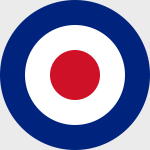Hobby Master HA7114 RAF Supermarine Spitfire Mk. XIV Fighter - Wing Commander, J. E. "Johnnie" Johnson, No.125 Wing, Copenhagen, Denmark, June 1945 (1:48 Scale)
"Never in the field of human conflict was so much owed by so many to so few."
- British Prime Minister Winston Churchill, commenting on the British airmen in the Battle of Britain
 The Spitfire is the most famous British aircraft of all time. Although less numerous than the Hawker Hurricane, it is remembered as the sleek, thoroughbred fighting machine that turned the tide during the Battle of Britain. The Spitfire was among the fastest and most maneuverable prop-driven fighters of World War II, serving in virtually every combat theater.
The Spitfire is the most famous British aircraft of all time. Although less numerous than the Hawker Hurricane, it is remembered as the sleek, thoroughbred fighting machine that turned the tide during the Battle of Britain. The Spitfire was among the fastest and most maneuverable prop-driven fighters of World War II, serving in virtually every combat theater.
Supermarine designer Reginald Mitchell created this small, graceful, elliptical-wing fighter with eight guns in the wings that were able to fire without being hindered by the propeller. The immortal Spitfire thus became not merely one of the best-performing fighters of all time, but also one of the best-looking. Although never employed as a long-range escort, the Spitfire was a champion in an air-to-air duel. Spitfires routinely dived at the speed of sound, faster than any of the German jets.
A carrier-based version, called the Seafire, was a winner in its own right, serving valiantly on convoy routes during World War II. The Seafire 47 was even used in the early stages of the Korean War, before it was replaced by more modern jet aircraft.
Pictured here is a 1:48 scale replica of a RAF Supermarine Spitfire Mk. XIV fighter that was piloted by Wing Commander, J. E. "Johnnie" Johnson, who commanded No.125 Wing, and deployed to Copenhagen, Denmark, during June 1945.
Sold Out!
Dimensions:
Wingspan: 9-inches
Length: 7-1/2-inches
Release Date: December 2023
Historical Account: "Towards the Inevitable End" - In March 1945, Johnson patrolled as Operation Plunder and Operation Varsity pushed Allied armies into Germany. There was little sign of the Luftwaffe. Numerous ground-attack operations were carried out instead. On March 26th, Johnson's wing was relocated to Twente and he was promoted to group captain. Days later Johnson took command of No.125 Wing. On April 5th, after returning from patrol in Spitfire Mk XIV MV268, he switched off the engine just as a Bf 109 flew overhead. Seeing the Spitfire, it turned in for an attack; Johnson took cover under his fighter while the airfield defenses shot down the 109. On April 16th, 1945, Johnson's wing moved to RAF Celle in Germany.
During the last week of the war, Johnson's squadron flew patrols over Berlin and Kiel as German resistance crumbled. During a flight over central Germany looking for jet fighters, Johnson's squadron attacked Luftwaffe airfields. On one sortie, his unit strafed and destroyed 11 Bf 109s that were preparing to take off. On another sortie, an enemy transport was sighted, but took evasive action and retreated back to German held territory but Johnson's pilots shot it down. On another occasion, Johnson intercepted a flight of four Fw 190s. The German fighters, however, waggled their wings to signal non-hostile intent and Johnson's unit escorted them to an RAF airfield.
After the German capitulation in May 1945, Johnson relocated with his unit to Copenhagen, Denmark. Here, his association with the Belgian No.350 Squadron RAF led him to be awarded the Croix de Guerre with Palm and the rank of officer of the Order of Leopold with Palms.


